| Milford Writer's Workshop (or more properly Milford Writers' Conference) | |
|---|---|
| Status | Active |
| Genre | Conference |
| Frequency | Annually |
| Venue | Various |
| Location(s) | • Milford, Pennsylvania, U.S. (before 1972) • Various locations, including the United Kingdom (1972–2019, 2021–) |
| Inaugurated | 1950s |
| Founder | Damon Knight, among others |
| Previous event | 16–23 September 2023 |
| Next event | 13–20 September 2024 |
| Participants | Science fiction writers |
| Activity | Writers' workshop |
| Website | milfordsf |
The Milford Writer's Workshop, or more properly Milford Writers' Conference, is an annual science fiction writer's event founded by Damon Knight, among others, in the mid-1950s, in Milford, Pennsylvania. It was so named because Knight, Judith Merril, and James Blish lived in Milford when it was founded. [1] It moved to the United Kingdom in 1972 and has run successfully ever since on an annual basis.
Judith Merril, James Blish, and Damon Knight founded the Milford Writer's Conference in 1956. [2] It is both a residential workshop and a writers' conference in which published science fiction writers convene over the course of a week to intensively critique stories and samples from novels (usually works in progress) and to workshop ideas on all aspects of SF writing. It is a peer-to-peer conference with no teachers or students.
Milford and related entities like Science Fiction Forum presaged the creation of the Science Fiction Writers of America in 1965 and that decade's New Wave movement. [2] In 1972, Blish in association with his wife, J.A.Lawrence, set up the United Kingdom Milford SF Writers' Conference, which initially met in Milford on Sea, Hampshire with an attendance of fifteen, mostly famous names in SF. Since then it has been held in various locations, latterly Devon until 2001, York in 2002 and 2003, and (since 2004) at Trigonos Conference Centre in North Wales, usually in mid September.
The conference went on hiatus in 2020, due to the Coronavirus lockdown.
An honorary committee is elected annually at the AGM held during the Milford week. The 2015 committee (elected 2014) comprised: Sue Thomason (Chair), Liz Williams (Secretary), Tina Anghelatos (Treasurer), Jacey Bedford (Vice-Chair, Website and Mailing Lists), Kari Sperring, and Karen Williams. Committee members are listed on the workshop's official web site.
Participants must have sold at least one science fiction story to qualify for attendance, and relative newcomers to publication are welcomed, though participants often have multiple novel and/or short story sales to their credit. Qualification details are quoted on the workshop's official website.
Workshop participants in the United States (pre-1972) included:
Milford is the model for other peer-to-peer science fiction writer workshops, including the Turkey City Writer's Workshop, the Clarion Workshop and the Clarion West Writers Workshop.[ citation needed ]
Participants in the UK (in 1972 and afterward) have included:
A full list of former Milford participants is listed on the workshop's official website.
Manuscripts are distributed beforehand. Everyone reads, critiques, and prepares before the formal workshop begins. Etiquette precludes participants from discussing the manuscripts beforehand either with the author or other members of the critique group. The participants sit in a circle. The author whose work is being critiqued must sit in silence through the first part, in which each participant in turn is allowed an uninterrupted four minutes (timed) to deliver their critique. Then the author has an uninterrupted right to reply. Following that a general discussion ensues. Constructive criticism is strongly encouraged. In the last few years it has become acceptable for the critiqued manuscripts to be given back to the author, complete with notes.
This so-called "Milford method" has been adopted by several writers' groups, including the Glasgow Science Fiction Writers Circle. [4] [5]

Cyril M. Kornbluth was an American science fiction author and a member of the Futurians. He used a variety of pen-names, including Cecil Corwin, S. D. Gottesman, Edward J. Bellin, Kenneth Falconer, Walter C. Davies, Simon Eisner, Jordan Park, Arthur Cooke, Paul Dennis Lavond, and Scott Mariner.
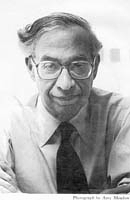
Donald Allen Wollheim was an American science fiction editor, publisher, writer, and fan. As an author, he published under his own name as well as under pseudonyms, including David Grinnell, Martin Pearson, and Darrell G. Raynor. A founding member of the Futurians, he was a leading influence on science fiction development and fandom in the 20th-century United States. Ursula K. Le Guin called Wollheim "the tough, reliable editor of Ace Books, in the Late Pulpalignean Era, 1966 and '67", which is when he published her first two novels in Ace Double editions.
The Futurians were a group of science fiction (SF) fans, many of whom became editors and writers as well. The Futurians were based in New York City and were a major force in the development of science fiction writing and science fiction fandom in the years 1937–1945.
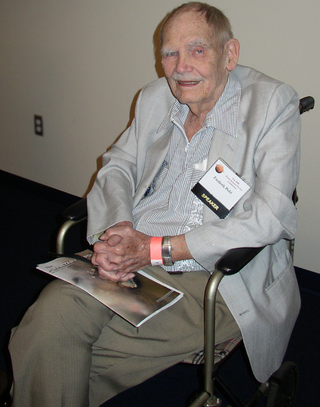
Frederik George Pohl Jr. was an American science-fiction writer, editor, and fan, with a career spanning nearly 75 years—from his first published work, the 1937 poem "Elegy to a Dead Satellite: Luna", to the 2011 novel All the Lives He Led.

James Benjamin Blish was an American science fiction and fantasy writer. He is best known for his Cities in Flight novels and his series of Star Trek novelizations written with his wife, J. A. Lawrence. His novel A Case of Conscience won the Hugo Award. He is credited with creating the term "gas giant" to refer to large planetary bodies.
The New Wave was a science fiction style of the 1960s and 1970s, characterized by a great degree of experimentation with the form and content of stories, greater imitation of the styles of non-science fiction literature, and an emphasis on the psychological and social sciences as opposed to the physical sciences. New Wave authors often considered themselves as part of the modernist tradition of fiction, and the New Wave was conceived as a deliberate change from the traditions of the science fiction characteristic of pulp magazines, which many of the writers involved considered irrelevant or unambitious.

Damon Francis Knight was an American science fiction author, editor, and critic. He is the author of "To Serve Man", a 1950 short story adapted for The Twilight Zone. He was married to fellow writer Kate Wilhelm.
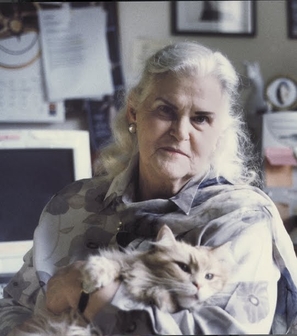
Anne Inez McCaffrey was an American writer known for the Dragonriders of Pern science fiction series. She was the first woman to win a Hugo Award for fiction and the first to win a Nebula Award. Her 1978 novel The White Dragon became one of the first science-fiction books to appear on the New York Times Best Seller list.

Dangerous Visions is an anthology of science fiction short stories edited by American writer Harlan Ellison and illustrated by Leo and Diane Dillon. It was published in 1967 and contained 33 stories, none of which had been previously published.
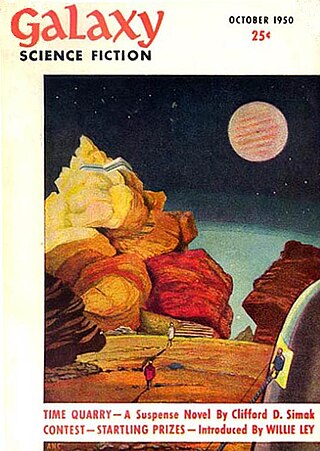
Galaxy Science Fiction was an American digest-size science fiction magazine, published in Boston from 1950 to 1980. It was founded by a French-Italian company, World Editions, which was looking to break into the American market. World Editions hired as editor H. L. Gold, who rapidly made Galaxy the leading science fiction magazine of its time, focusing on stories about social issues rather than technology.

Judith Josephine Grossman, who took the pen-name Judith Merril around 1945, was an American and then Canadian science fiction writer, editor and political activist, and one of the first women to be widely influential in those roles.
A strong element in contemporary Canadian culture is rich, diverse, thoughtful and witty science fiction.

Arrowhead is the name that science fiction writer James Blish and his wife, literary agent and science fiction writer Virginia Kidd, gave to their home in Milford, Pennsylvania. The Virginia Kidd Literary Agency has been operating continuously at Arrowhead since 1965.

The Squares of the City is a science fiction novel by British writer John Brunner, first published in 1965 (ISBN 0-345-27739-2). It was nominated for the Hugo Award for Best Novel in 1966.

NESFA Press is the publishing arm of the New England Science Fiction Association, Inc. The NESFA Press primarily produces three types of books:

The Ship Who Sang (1969) is a science fiction novel by American writer Anne McCaffrey, a fix-up of five stories published 1961 to 1969. It is also the title of the 1961 novelette which is the first of these stories. The series started by the book, the "Brain & Brawn Ship series", is sometimes called the "Ship Who Sang series".
With the growth of science fiction studies as an academic discipline as well as a popular media genre, a number of libraries, museums, archives, and special collections have been established to collect and organize works of scholarly and historical value in the field.
Emily Pohl-Weary is a Canadian novelist, poet, university professor, and magazine editor. She is the granddaughter of science fiction writers and editors Judith Merril and Frederik Pohl.
Virginia Kidd was an American literary agent, writer and editor, who worked in particular in science fiction and related fields. She represented science fiction American authors such as Ursula K. Le Guin, R.A. Lafferty, Anne McCaffrey, Judith Merril, and Gene Wolfe. Wolfe modeled Ann Schindler, a character in his 1990 novel Castleview, in large part on Kidd.
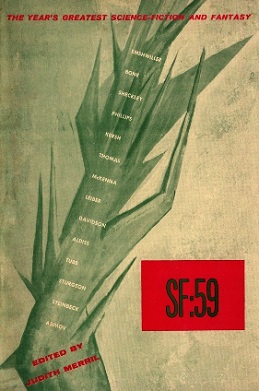
SF '59: The Year's Greatest Science Fiction and Fantasy is a 1959 anthology of science fiction and fantasy short stories and articles edited by Judith Merril. It was published by Gnome Press in an edition of 5,000 copies, some of which were never bound. It was the fourth in a series of 12 annual anthologies edited by Merrill. Most of the stories and articles originally appeared in the magazines Fantasy and Science Fiction, Astounding, Playboy, The Saturday Evening Post, If, Galaxy Science Fiction, Nebula, Science-Fantasy, Fantastic Universe, Venture, Lilliput, The New Yorker and Future.